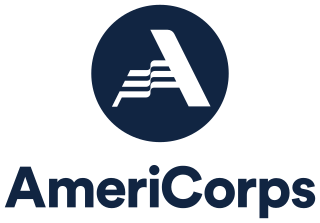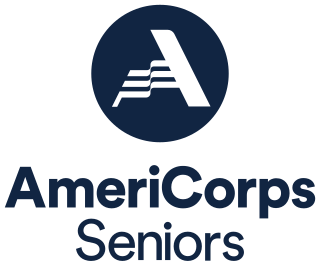A gap year, also known as a sabbatical year, is a period of time when students take a break from their studies, usually after completing high school or before beginning graduate school. During this time, students engage in a variety of educational and developmental activities, such as traveling, working, volunteering, or taking courses. Gap years are not limited to a year-long break and can range from several months to a few years.
Teach For America (TFA) is a nonprofit organization whose stated mission is to "enlist, develop, and mobilize as many as possible of our nation's most promising future leaders to grow and strengthen the movement for educational equity and excellence".
Student financial aid in the United States is funding that is available exclusively to students attending a post-secondary educational institution in the United States. This funding is used to assist in covering the many costs incurred in the pursuit of post-secondary education. Financial aid is available from federal and state governments, educational institutions, and private organizations. It can be awarded in the form of grants, loans, work-study, and scholarships. In order to apply for federal financial aid, students must first complete the Free Application for Federal Student Aid (FAFSA).

City Year is an American education nonprofit organization founded in 1988. The organization partners with public schools in 29 high-need communities across the US and through international affiliates in the UK and Johannesburg, South Africa. City Year teams are made up of 18 to 24 year olds, who provide student, classroom, and whole school support, intended to help students stay in school and on track to graduate high school. City Year is a member of the AmeriCorps national service network, and is supported by the Corporation for National and Community Service, school district partnerships, and private philanthropy from corporations, foundations and individuals.

James A. Garfield High School is a public high school in the Seattle Public Schools district of Seattle, Washington, United States. It is named after James A. Garfield, the 20th President of the United States. Located along 23rd Avenue between E. Alder and E. Jefferson Streets in Seattle's urban Central District, Garfield draws students from all over the city. Garfield is also one of two options for the district's Highly Capable Cohort for academically highly gifted students, with the other being Ingraham International School. As a result, the school offers many college-level classes, ranging from calculus-based physics to Advanced Placement (AP) studio art.
A Pell Grant is a subsidy the U.S. federal government provides for students who need it to pay for college. Federal Pell Grants are limited to students with exceptional financial need, who have not earned their first bachelor's degree, or who are enrolled in certain post-baccalaureate programs, through participating institutions. Originally known as a Basic Educational Opportunity Grant, it was renamed in 1980 in honor of Democratic U.S. Senator Claiborne Pell of Rhode Island. A Pell Grant is generally considered the foundation of a student's financial aid package, to which other forms of aid are added. The Federal Pell Grant program is administered by the United States Department of Education, which determines the student's financial need and through it, the student's Pell eligibility. The U.S. Department of Education uses a standard formula to evaluate financial information reported on the Free Application for Federal Student Aid (FAFSA) for determining the student's Expected Family Contribution (EFC).

AmeriCorps is an independent agency of the United States government that engages more than five million Americans in service through a variety of stipended volunteer work programs in many sectors. These programs include AmeriCorps VISTA, AmeriCorps NCCC, AmeriCorps State and National, AmeriCorps Seniors, the Volunteer Generation Fund, and other national service initiatives. The agency's mission is "to improve lives, strengthen communities, and foster civic engagement through service and volunteering." It was created by the National and Community Service Trust Act of 1993. In September 2020, the agency rebranded itself as AmeriCorps, although its official name is unchanged.

Frank Vana Chopp is an American politician serving as a Democratic member of the Washington House of Representatives, representing the 43rd district since 1995. His district covers the neighborhoods of Montlake, Fremont, Wallingford, the University District, Madison Park, and part of Capitol Hill, all of which are in Seattle. Chopp served as Speaker of the House from 2002 to 2019.
Teacher Corps, whose correct title was the National Teacher Corps, was a program established by the United States Congress in the Higher Education Act of 1965 to improve elementary and secondary teaching in predominantly low-income areas. Individual Teacher Corps projects were developed by "institutions of higher education" in partnership with local school districts. The local director was a college professor, and courses specific to teaching inner city students and disadvantaged students were developed by the college and used in the master's level education program. Teams of interns under the supervision of master teachers worked in the district's schools to help carry out project goals. The purpose of the Teacher Corps was to train and retain teachers for disadvantaged school districts, who would work with the communities they served. Some of the interns became teachers in the communities they had worked in after the program ended. Others took jobs elsewhere teaching disadvantaged students, usually in their home states. Interns worked on community projects in addition to teaching. One of the Trenton, NJ community programs that continued for years after the program ended, was an annual carnival fundraiser to raise money for the Mott Elementary School library.

Edmonds College, formerly Edmonds Community College, is a public community college in Lynnwood, Washington. More than 17,000 students annually take courses for credit toward a certificate or degree at the college. The college employs more than 1,300 people, including 126 full-time and 283 part-time instructors and 267 students.

AmeriCorps Seniors is a United States government program run by the Corporation for National and Community Service. The program engages volunteers aged 55 and older to serve their communities. There are over 200,000 volunteers nationwide.

Playworks is an Oakland-based national nonprofit that supports learning and physical health by providing safe and inclusive play to low-income students in urban schools. Playworks works with schools to design curriculum and activities that offer play opportunities during recess, lunch and after school programs. Trained coaches work in schools to run a variety of games and sports, as well as teach techniques in group management, violence prevention and conflict resolution.

Literacy Volunteers of Illinois (LVI) is a 501(c)(3) nonprofit organization that promotes adult literacy throughout Illinois. It serves families, adults, and out-of-school teens.
College Possible is a nonprofit AmeriCorps organization making college admission and success possible for low-income students in the United States through an intensive curriculum of coaching and support. Its model uses recent college graduates serving an AmeriCorps term of service as near-peer mentors for students lacking the social resources to successfully enroll in and graduate from college. Headquartered in Saint Paul, Minnesota, the organization serves students in all 50 states with offices located in the Minneapolis-Saint Paul metro area, Chicago, Milwaukee, Omaha, Portland, Philadelphia and Seattle.

The Edward M. Kennedy Serve America Act or Serve America Act was introduced in the United States House of Representatives on March 9, 2009, by Representative Carolyn McCarthy of New York. Originally titled the Generations Invigorating Volunteerism and Education Act, the bill reauthorizes and expands the AmeriCorps program that was first established in 1993. It passed in the House of Representatives on March 18, 2009. The U.S. Senate debated and approved an amended version of the bill on March 26, 2009, renaming it the Edward M. Kennedy Serve America Act, after Senator Ted Kennedy. The House of Representatives voted on the bill a second time, approving the amended version on March 31, 2009. It was signed by President Barack Obama on April 21, 2009.

AmeriCorps VISTA is a national service program designed to alleviate poverty. President John F. Kennedy originated the idea for VISTA, which was founded as Volunteers in Service to America in 1965, and incorporated into the AmeriCorps network of programs in 1993. VISTA is an acronym for Volunteers in Service to America.
The Ronald E. McNair Post-Baccalaureate Achievement Program, also referred to as the McNair Scholars Program, is a United States Department of Education initiative with a goal of increasing "attainment of PhD degrees by students from underrepresented segments of society," including first-generation low-income individuals and members from racial and ethnic groups historically underrepresented in graduate programs.

College Match is a non-profit organization based in Los Angeles, California. It was established in 2003 to help high-achieving low-income students from Los Angeles inner-city public high schools, by providing them with a wide range of free personalized college preparation services usually reserved for wealthier students. Since its inception, College Match has paved the way for many students to be accepted to and graduate from selective four year colleges.
The Jack Kent Cooke Foundation is a private, independent foundation which provides scholarship programs to gifted students in the U.S. who have financial need. It offers academic advising and other support services to students from 8th grade to graduate school. Since 2000, it has awarded over $175 million in scholarships to nearly 2,300 students and more than $97 million in grants to organizations that serve gifted low-income students.
Educational interventions for first-generation college students (FGCS) are programs intended to provide resources and make education more attainable and desirable for FGCS and their families. A study by Alex Casillas has identified that "FGCS […] face greater pressure not to go to college, either because of a lack of role models or because of pressure to contribute to their family's financial needs." Many interventions are being explored to lower and/or remove the fears and struggles FGCS face regarding their education. These interventions are intended to bridge the gap between FGCS and their educational experience by providing them with the access to information and resources their non-first-generation peers already have. This article discusses several programs currently being implemented, including AVID, GEAR-UP, and after-school programs, in addition to non-profit college access programs and privately funded organizations that work to address access to higher education for underprivileged and first-generation students. There is also critical discussion regarding the pedagogical role of these educational interventions in building a sense of value and belonging in its students.










